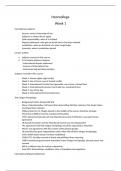Summary
Alles wat je moet weten voor het vak Public International Law (samenvatting hoorcolleges, werkcolleges, arresten)
- Course
- Institution
Alles wat je moet weten voor het vak Public International Law (samenvatting hoorcolleges, werkcolleges, arresten). Zelf heb ik met deze aantekeningen het vak gehaald en het biedt daarmee een compleet overzicht van het vak.
[Show more]



